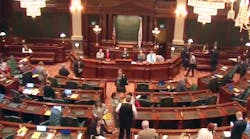The Illinois Senate has approved a compromise school funding bill that takes steps to reform the way the state funds public education.
The Chicago Sun-Times reports that the legislation is intended to provide additional money for the state’s poorest and neediest school districts — and to try to ease the state’s reliance on local property taxes to pay for schools.
The existing school aid formula has enabled wealthier communities to pump more money into public education while poor districts fall further behind.
A spokeswoman for Gov. Bruce Rauner says the governor will sign the legislation “as soon as possible.”
EARLIER: After first rejecting a compromise school funding plan Monday evening, the Illinois House has approved legislation that seeks to address inequities in the state's public-school funding formula.
The house failed to pass the compromise measure on its first try — only 14 Democrats voted for it — but that was a largely symbolic act orchestrated by Democrats to show their disdain of one of the bill’s unpopular aspects: a $75 million private school scholarship and tax-credit program that teachers unions oppose.
The house then held an override vote to challenge Rauner's veto of an earlier version of an education-funding bill — but that effort also fell short. The override attempt was done to appease many Democrats who for weeks had been advocating for such a vote.
House members then held another vote on the compromise bill, and it passed 73 to 34.
The compromise on school finance was reached after weeks of negotiations. Without a funding plan in place, the state cannot disburse aid to public schools.
The compromise bill also includes a $75 million private school scholarship and tax credit program that opponents have characterized as private-school “vouchers.” Some Democratic house members said they couldn’t support the deal because of the private school scholarship allocation.
The bill would allow Chicago to raise its property tax levy to pay for teacher pensions; includes a minimum funding level of $350 million; allows for property tax relief for some districts via referendum; and removes some unfunded state mandates from local schools, among other factors.


